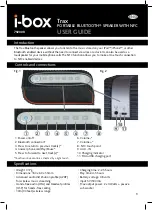
14
2.9 BATTERY SAFETY
1. wear gloves and safety glasses or face shield
when working on or near batteries.
2. Use a battery carrier to lift the battery or place
hands at opposite corners to avoid spilling
acid through the vents.
3. Avoid contact with battery electrolyte:
External Contact:
Flush immediately with
water.
Eye Contact:
Flush with water for 15 minutes.
Get prompt medical attention. Clean up any
spilled electrolyte immediately.
4. Avoid contact with battery posts, terminals
and related accessories, they contain lead
and lead compounds, chemicals known to
cause harm. wash hands immediately after
handling battery.
5. Keep all sparks and flames away from batter-
ies, as gas given off by electrolyte is explo-
sive.
6. To avoid injury from spark or short circuit, dis-
connect battery ground cable before servicing
any part of the electrical system.
7. FRoZEn BATTERIES CAn
ExPLoDE and result in death
or serious injury. Do noT
jump start / charge a frozen
battery. Let battery thaw be-
fore charging.
Caution:
Poison / Danger - Causes
Severe Burns. The battery contains
sulphuric acid. Avoid contact with skin,
eyes or clothing. Keep out of reach of
children.
4. Do not allow children to play on or around the
stored machine.
5. Place the generator on a level surface. Tilt-
ing or laying it on its side can cause fuel or
oil leakage. Support the frame with planks if
required.
6. Allow the engine / exhaust to cool. A hot
engine and exhaust system can ignite or melt
some materials.
7. with the engine and exhaust system cool,
cover the generator to keep out dust.
8. Do not use a nonporus sheet as a dust cover.
A nonporous cover will trap moisture around
the generator, promoting rust and corrosion.
2.11 ELECTRICAL SAFETY
1. The generator produces
enough electric power to
cause a serious shock or
electrocution if misused.
2. Using a generator or
electrical appliance in wet
conditions (rain or snow),
or near a pool or sprinkler system, or when
your hands are wet, could result in electrocu-
tion. Keep the generator and the immediate
area dry.
3. If the generator has been outdoors, unprotect-
ed from the weather, check all of the electri-
cal components on the control panel before
each use. Moisture can cause a short circuit
in electrical components that could result in
electrocution.
4. Do not connect to a building’s electrical sys-
tem unless an transfer / isolation switch has
been installed by a qualified electrician.
5. NEVER
tamper with the factory settings of
the engine or engine governor. Engine speed
controls frequency portion of the electrical out-
put (60hZ) Personal injury or damage to the
engine or equipment can result if operating in
speed ranges above the maximum or below
the minimum allowable.
2.10 STORAGE SAFETY
1. Store the unit in a well vented area away from
human activity.
2. If possible, store in a dry area, avoid storage
areas with high humidity, because that pro-
motes rust and corrosion.
3. Avoid any area where power tools are oper-
ated or spark-producing electric motors.
U1 Lawn & Garden 250 CCA
battery is recommended















































